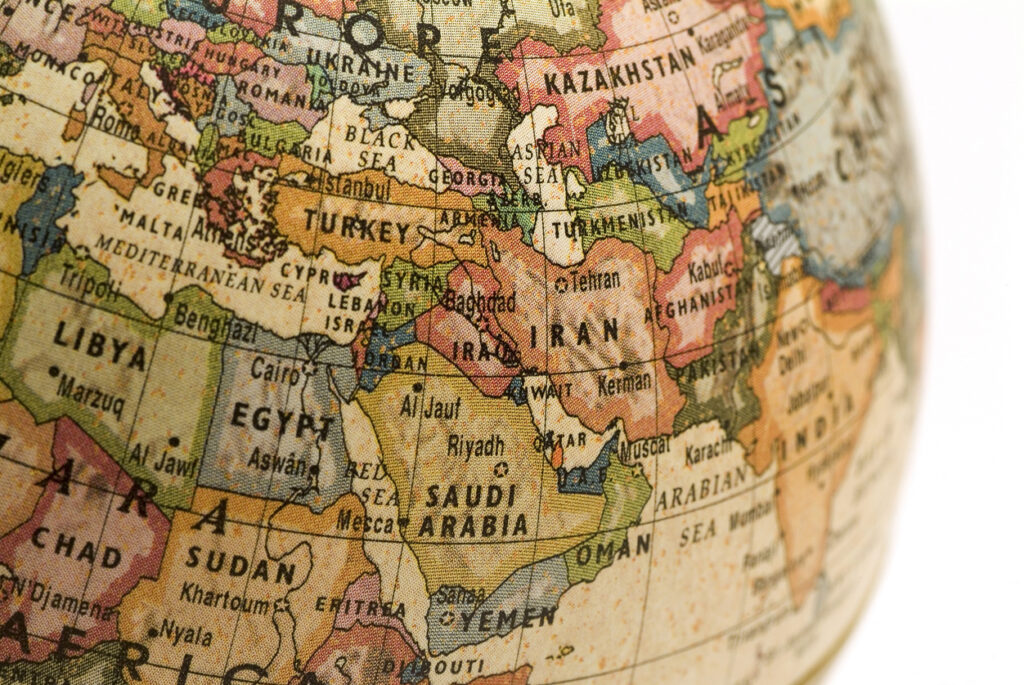With the UK being the world’s 4th largest exporter, it should come as no surprise that the UK brand is strong and its high-quality goods and services are in demand by global markets.
Whilst Europe has historically been the UK’s largest trading partner, post-Brexit has seen an increase in exports to other regions including the Middle East and North Africa (MENA).
UK exports to the GCC trading bloc (Saudi Arabi, Kuwait, Bahrain, Qatar, UAE, Oman) totalled almost GBP35 billion for the year to the end of the 2nd quarter 2024 and GBP5.3 billion to North Africa for the same period (ONS data).
A wealth of opportunities
Many markets within the MENA region are export growth areas with UK Government (DBT) Trade Advisers identifying opportunities across a range of sectors, including: & renewable energy
- Clean & renewable energy
- Oil & Gas
- Education & Training
- Financial & Professional Services including Fintech
- Infrastructure
- Cyber security & Space
- Healthcare & Life Sciences
- Retail & luxury consumer products
Export opportunities bring rewards, with UK exporting businesses statistically being more competitive, paying higher wages, and more profitable. However, opportunities can also bring challenges and risks which need to be considered by the exporter from the outset of a new trading relationship. With 15 years of operating across the MENA region, and with local presence in 4 regional offices, our team of international commercial recoveries and trade advisory specialists have seen all manner of scenarios when it comes to non-payment of export sales contracts. It can certainly be a volatile region, with risks varying from political and social unrest to market fluctuations, currency shortages, and capital controls.
The United Arab Emirates (UAE) is one of the UK’s most important trading partners and continues to be a growth market. With exports totalling GBP14 billion for the year to the end of the 2nd quarter 2024, the UAE is the UK’s 16th largest export market overall, and largest within the MENA region. This is closely followed by Saudi Arabia, the UK’s 18th largest trading partner, with GBP13 billion of exports for the same period.
Addressing the challenges
Whilst legislation in the UAE has made it an incredibly easy place to establish a company and do business, that ease has unfortunately created an environment open to fraud with virtual companies being rapidly opened – and then just as rapidly closed or simply abandoned – specifically to defraud. To avoid the risk of buyer fraud, exporters should ensure that robust due diligence / KYC / compliance checks are undertaken including obtaining bank references and verified audited accounts. In our experience, these checks are best done on the ground with in-person visits to buyer premises and auditor offices.
In North Africa, chronic trade deficits and negative balance of payments continue exerting pressure on local currencies, eventually leading to devaluations that are closely followed by capital controls. The FX shortages and associated currency devaluations result in an importer being left with local-currency receivables that are worth far less than when the purchase terms were agreed in GBP, leading to direct losses and consequently an inability to honor their payment obligations. To reduce the risks of exporting to such markets and the impact of potential non-payment, particularly where no payment security is in place, exporters may wish to consider selling in smaller shipments and with shorter payment terms.
Keeping up to date with the import requirements across the whole region can be daunting. For example, the UAE introduced a new regulation requiring certain food and beverage products exported to the UAE to display the Emirates Quality Mark (EQM) logo. For the first 3 years, it was acceptable for the logo to be added as a sticker on the product, but subsequently the logo had to be printed on the food labels themselves. Although the majority of export contracts place the import-clearance risk on the importer (eg Incoterms F and C type contracts), importers who are unable to clear and sell their goods are not likely to readily honor their payment obligations.
Avoiding non-payment
Protection against non-payment – which is likely to come at a cost to the exporter – can be obtained to a greater or lesser extent by utilising tools such as documentary collections, trade credit insurance, or a letter of credit issued by the buyer and (ideally) confirmed by a UK registered bank.
However, even if there is some level of payment protection in place, consideration should still be given when drafting the sales contract as to what might happen in the event of a default. Even with a confirmed letter of credit, if the documents presented by the exporter are discrepant and rejected by the buyer, non-payment is still very much a possibility. Sales contracts should therefore always be drafted with enforcement in mind. Questions such as “how would a dispute be resolved (Litigation vs Arbitration)?’ or ‘is a court verdict in England & Wales enforceable in the buyers’ jurisdiction?’’ need to be addressed and can best be answered by trade and legal experts with local knowledge of the court systems and court tendencies. Even the choice of Incoterm in an export contract can have some bearing of how easy it may be to prove delivery in the event of a buyer refusing to pay by claiming non-receipt of the goods.
In summary, the MENA region has huge potential for UK exporting businesses, but there is a risk that its rewards will come at a price. At Recovery Advisers, we are here to help exporters reduce risk and uncertainty when trading with overseas buyers, from that first step of verifying trading partners to reviewing and drafting contracts to ensure enforceability. For more information, please contact [email protected].




